
Company In Panic Mode After HR Step In To Stop Critical Worker’s 8% Raise, So He Quits
A linchpin, sometimes spelled “lynchpin,” is a generally small fastener used to keep wheels and basically everything else from flying off of an axel while it’s in motion. When we think about a vehicle, we might think of its engine or any other sizable part, but remove the linchpin and the whole thing will come undone. And as many people have already experienced, some employees punch way above their pay grade in importance.
One netizen shared just such an example, where an overworked and absolutely vital IT worker was denied a raise and decided to pursue a job elsewhere. The company very quickly learned to regret undervaluing this person, but it was too little, too late.
Certain workers are the beating heart of an organization
Image credits: cottonbro studio (not the actual photo)
One worker shared their experience watching a company fall into disaster after they lost a crucial worker over a denied raise
Image credits: Kampus Production (not the actual photo)
Image credits: Jules Amé (not the actual photo)
Image credits: u/theredranger132
Bad managers care more about preserving their position than keeping the company running well
Image credits: Jo Szczepanska (not the actual photo)
While OP does not provide the exact reasoning behind these decisions, it’s pretty clear that somewhere “upstairs” someone messed up and seems to be refusing to see reality. There are a number of possibilities. The HR team is so stubborn that they will tank the company over this issue, or that someone making that decision believes that “giving in” is equivalent to admitting they were wrong. However, there is also the third possibility, often true for management, the belief that they can’t ever be wrong and as a result refuse to entertain reality. There is some evidence to suggest that very often, managers do have an inflated perception of self, which comes with the inability to deal with mistakes or bad ideas.
While on paper it makes little sense, very often less-skilled individuals will manage to find ways to the top through manipulation, networking and just being louder than anyone else. Individually, this is a viable strategy, but it often comes with the ever-present knowledge that you are not actually suited for a role. Toxic managers who feel this way will try their utmost to hide their lack of confidence by creating negative outcomes for employees. While they might be able to maintain this game for a while, the end result is often that it gets taken too far, such as in OP’s story. The cost of such a manager’s mistake will be paid by the company, in this case creating a disaster, as reported by OP.
In general, the fact that there was just one person as a linchpin to so many projects is a management failure on so many levels. Even if this employee was happy to carry such a weight on their shoulders indefinitely, accidents happen, people get sick, injured, or need to go on vacation. More realistically, even if this worker is relatively happy, they will burn out. While we often associate burnout with poor working conditions, which absolutely do cause it, this problem can strike even motivated employees. Even if OP’s coworker wasn’t leaving, he would likely need to take a break after a year or two anyway.
Undervalued workers tend to not stay at jobs for long
Image credits: Microsoft 365 (not the actual photo)
Seeing as this worker covered so many projects, burnout, a new job or even death would all basically mean the same level of disaster for the company. The middle option really should not be a surprise for anyone involved, as it’s pretty common knowledge that workers who feel undervalued are simply more likely to leave. While it’s possible to argue about what exactly “undervalued” looks like, this IT worker broke it down to its basics. He found competing salaries for what were probably easier jobs, then was denied a raise. Even worse, he was denied a raise after his boss said it would be approved. So instead of looking like it maybe “wasn’t possible,” this worker literally saw someone in a higher position veto a well-deserved raise.
This is, unfortunately, more common than not, as over half of US workers who voluntarily quit or left their jobs cited bad management as a key issue. This can manifest itself in a million different ways, but not approving a reasonable, well-deserved raise is as clear as it gets. The weird power dynamic of this company doesn’t help either, as it’s not exactly common practice that HR can overrule certain decisions that easily. OP is right to be exploring a new job, as this structure seems set up to fail. Even if the company survives this storm and OP keeps their job, there is likely going to be another disaster, as trusting management to learn from their mistakes is, well, a mistake.
OP gave some follow-up details
Other commenters shared their confusion at the company’s decision
What exactly can you do to HR. HR is that powerful. India produces thousands of IT guys every year and there is always someone smarter and cheaper. HR know this that's why they never budge.
Load More Replies...Something is upside down in that company. HR's task is to handle conflicts between the company and the employess, or between two employess, or be the link that can translate the messages from the management into something the employess can handle etc. it is NOT them that should make financial decitons, and definitely not setting salaries. But somehow they have ended up with too much power, and is making decitions which they do not have the qualifications or competences to make. The CIO ought to step up, especially in this day and age where there is a lack of people with IT/programming skills and such people is therefore their weight worth in gold... and if he does not have the backbone for that, the CEO should step in before the entire company is falling apart, instead of playing best buddy with HR while his company is in flames.
HR's job is to protect the company from lawyers. Full stop. These guys have inverted the priority of the departments, vis a vis HR and IT. Without IT, you have nothing in today's climate.
Load More Replies...What exactly can you do to HR. HR is that powerful. India produces thousands of IT guys every year and there is always someone smarter and cheaper. HR know this that's why they never budge.
Load More Replies...Something is upside down in that company. HR's task is to handle conflicts between the company and the employess, or between two employess, or be the link that can translate the messages from the management into something the employess can handle etc. it is NOT them that should make financial decitons, and definitely not setting salaries. But somehow they have ended up with too much power, and is making decitions which they do not have the qualifications or competences to make. The CIO ought to step up, especially in this day and age where there is a lack of people with IT/programming skills and such people is therefore their weight worth in gold... and if he does not have the backbone for that, the CEO should step in before the entire company is falling apart, instead of playing best buddy with HR while his company is in flames.
HR's job is to protect the company from lawyers. Full stop. These guys have inverted the priority of the departments, vis a vis HR and IT. Without IT, you have nothing in today's climate.
Load More Replies...
 Dark Mode
Dark Mode 

 No fees, cancel anytime
No fees, cancel anytime 



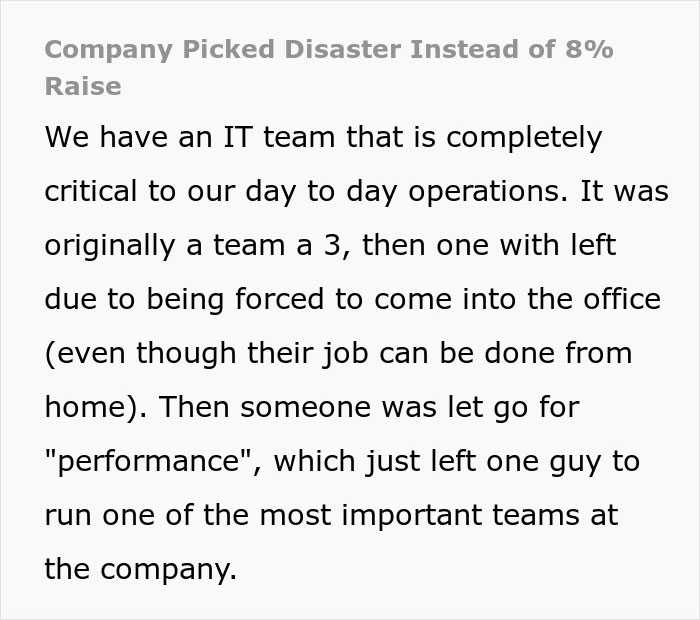
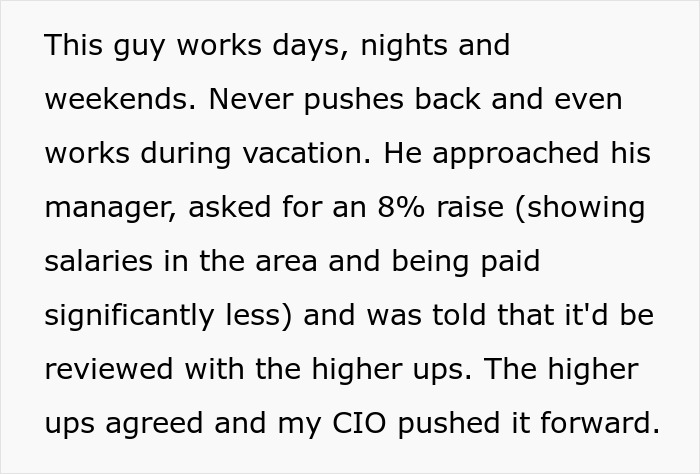
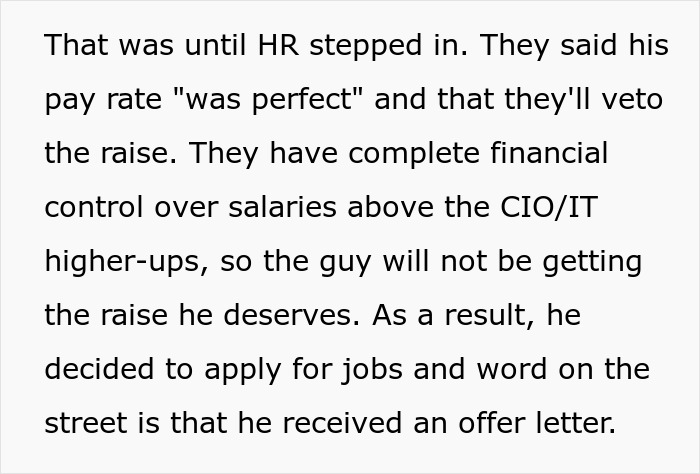
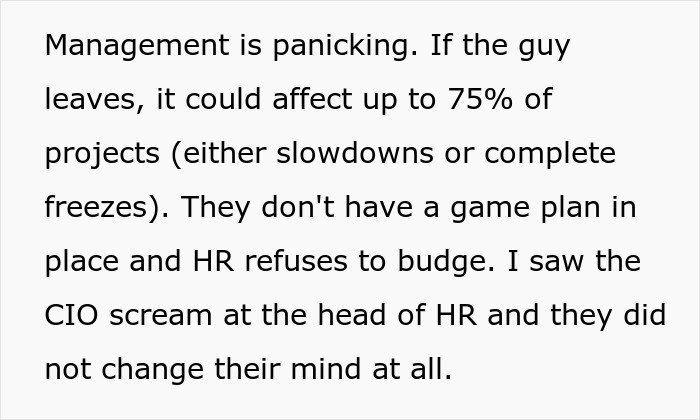

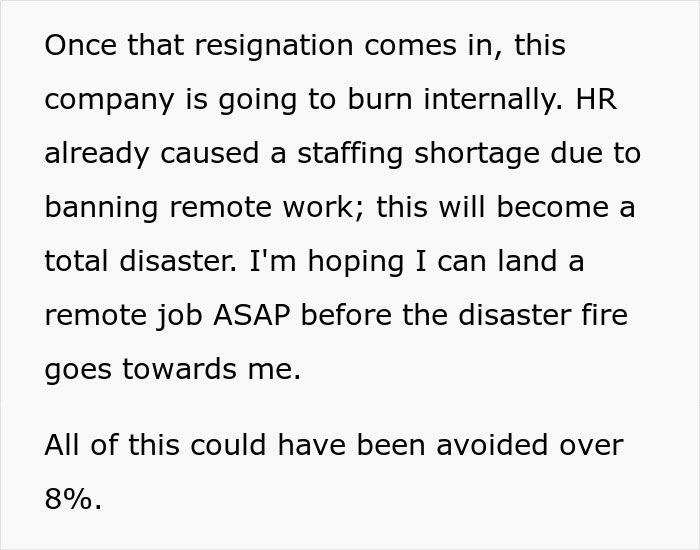
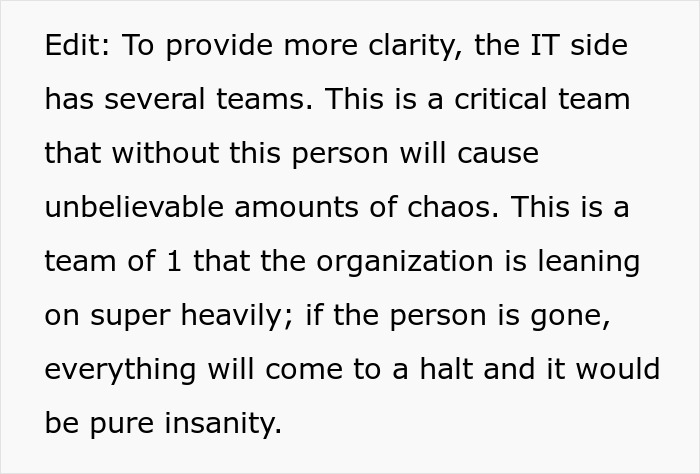

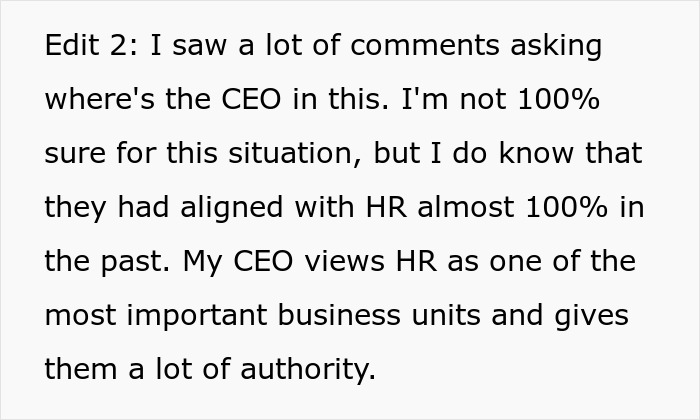
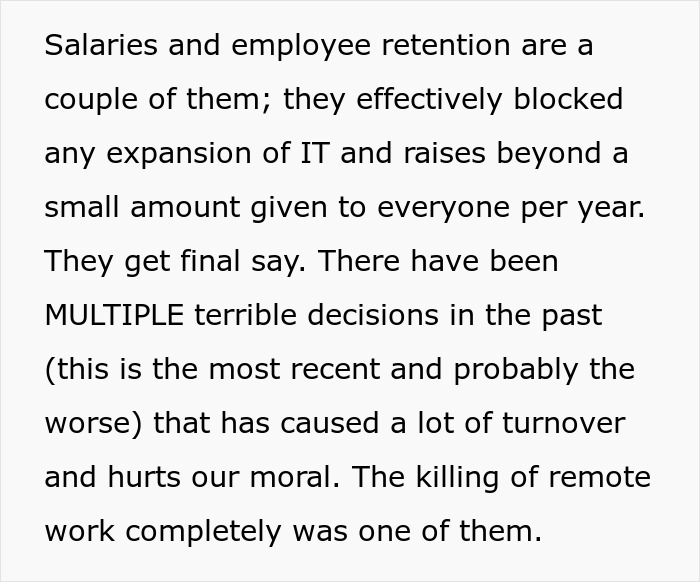

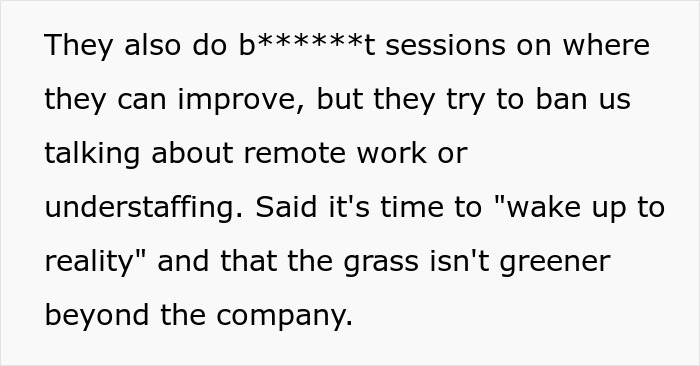
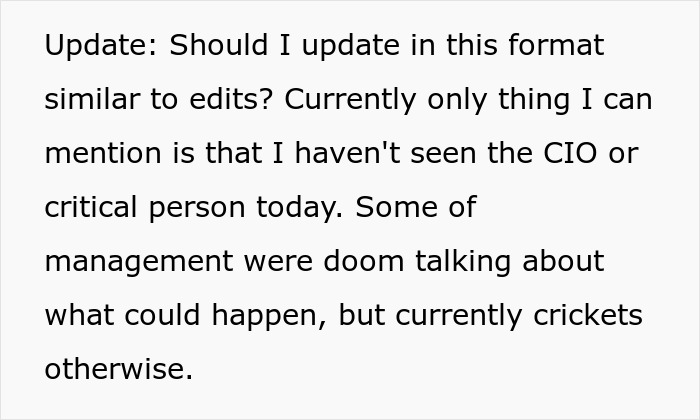
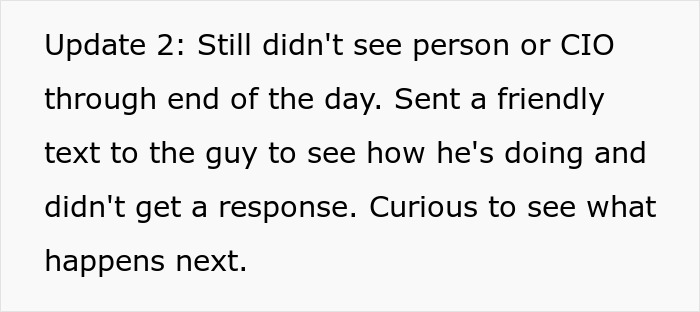


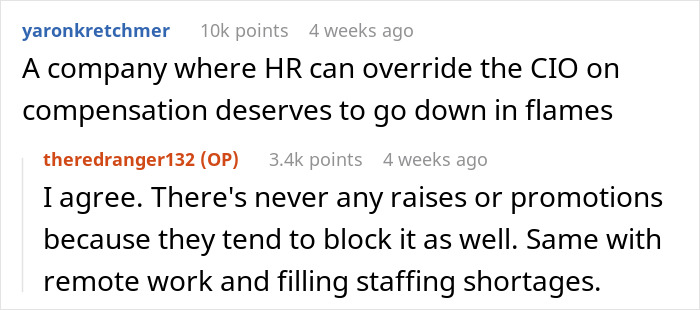
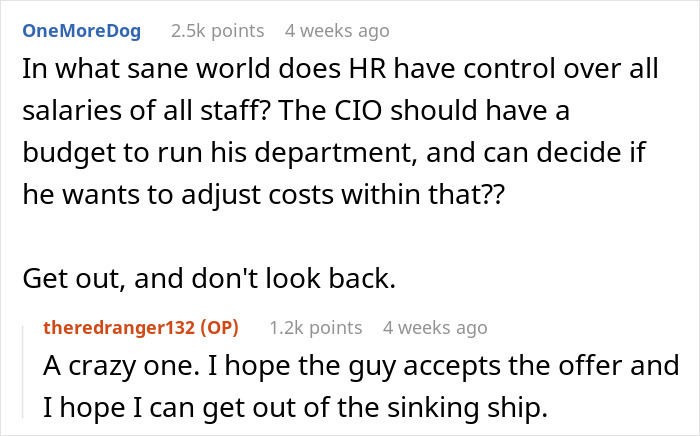
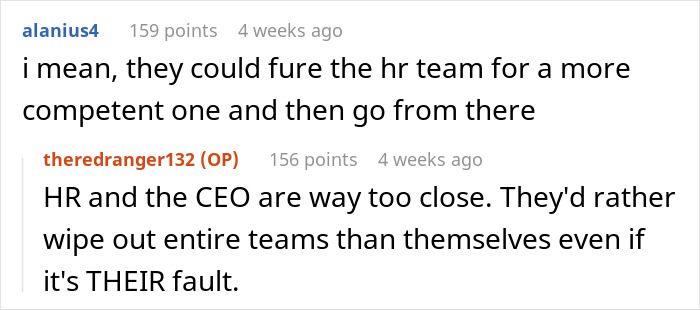
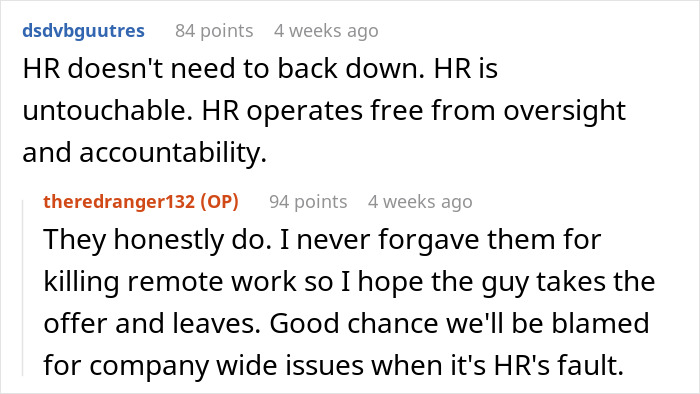
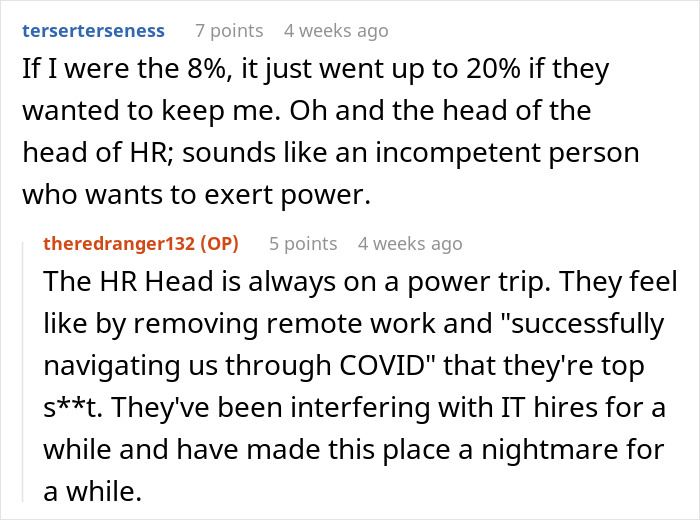
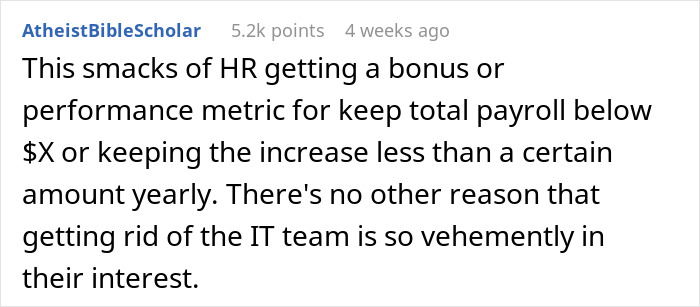
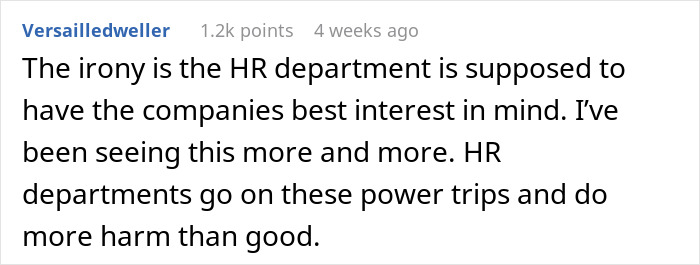

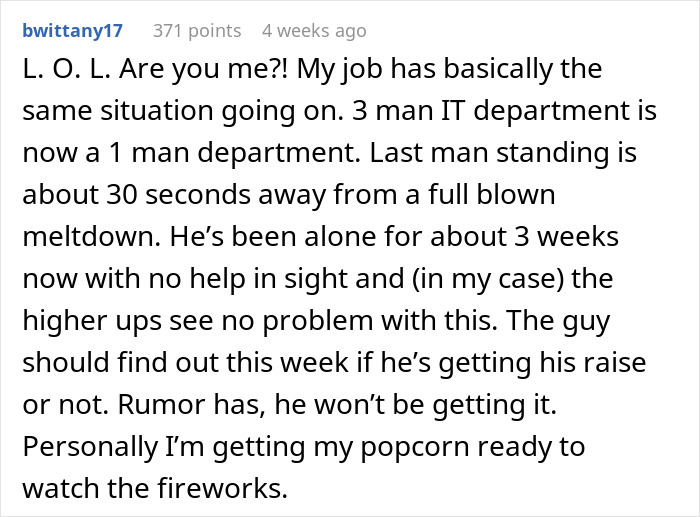
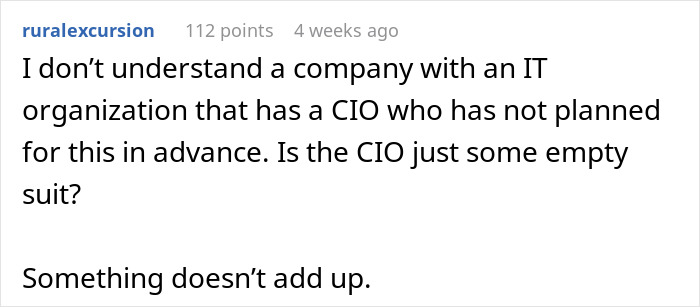


























69
26